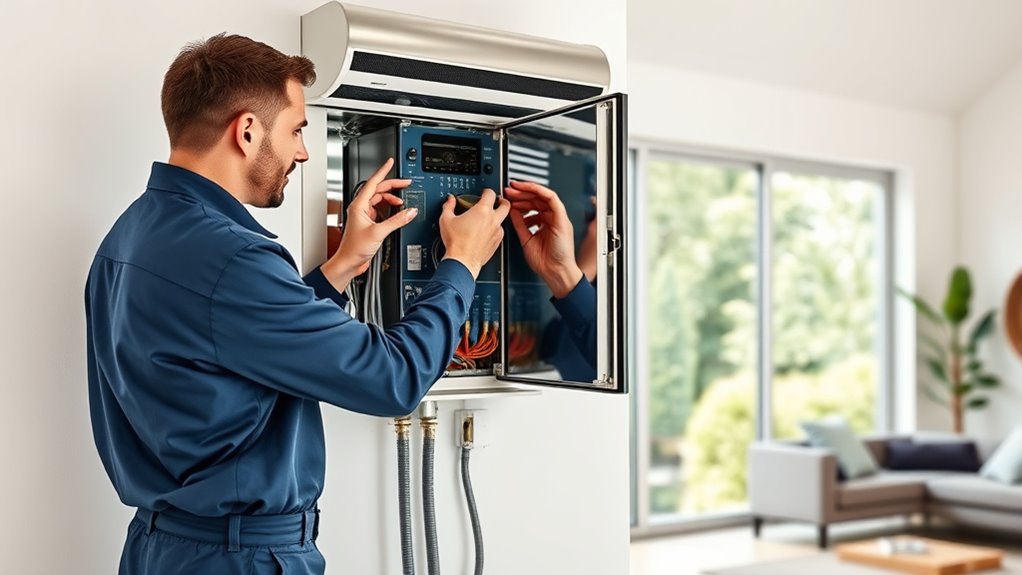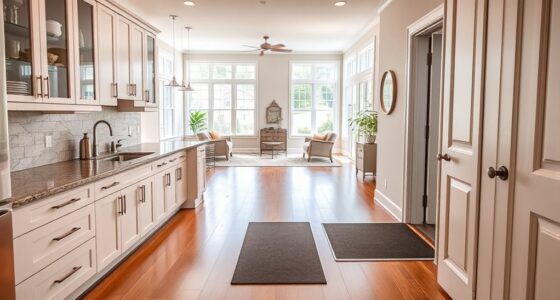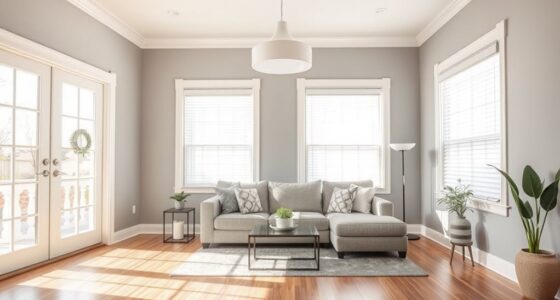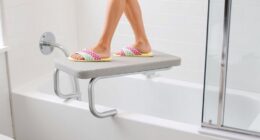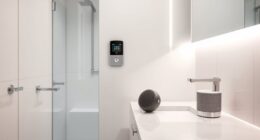Upgrading your heating and cooling systems boosts energy efficiency, cuts utility bills, and improves indoor air quality. Modern systems include smart controls, advanced filters, and renewable options like solar and geothermal energy. These upgrades enhance comfort, reliability, and system longevity while offering potential incentives. Ensuring compatibility and professional installation is key. Stay with us to discover how expert guidance can help you maximize your new HVAC system’s benefits.
Key Takeaways
- Conduct a professional assessment to ensure compatibility with existing HVAC components and identify the most suitable upgrades.
- Choose high-efficiency systems, such as high-SEER units, smart thermostats, and renewable energy options like solar or geothermal.
- Upgrade filtration and air purification technologies, including HEPA filters and UV-C systems, to improve indoor air quality.
- Ensure proper installation and regular maintenance to maximize system lifespan, efficiency, and performance.
- Take advantage of incentives, rebates, and tax credits available for energy-efficient and sustainable HVAC upgrades.
Benefits of Modern HVAC Upgrades
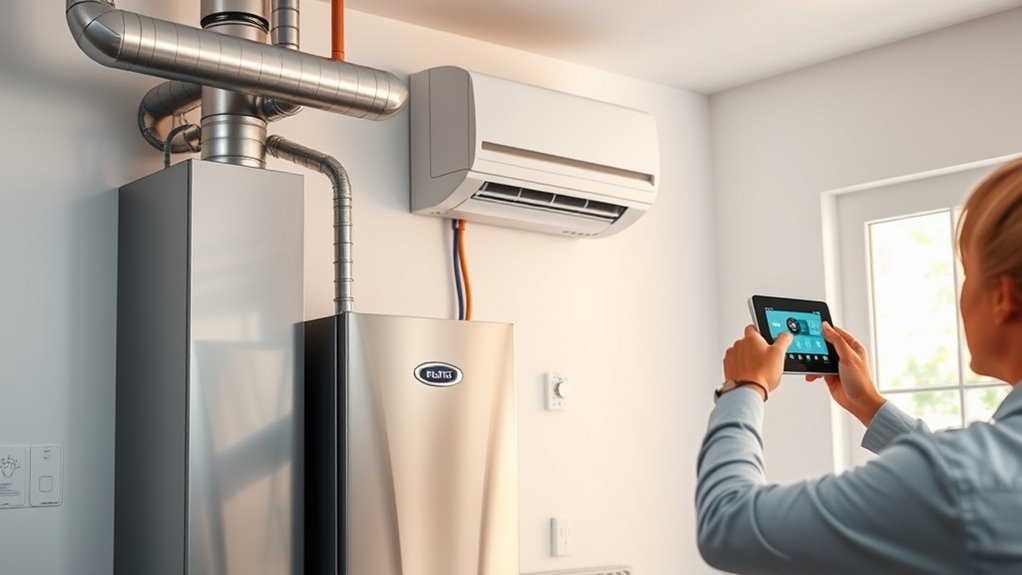
Upgrading to a modern HVAC system offers several clear advantages. You’ll notice improved energy efficiency, with new units achieving up to 30% higher performance, which means lower utility bills.
HVAC upgrades also enhance indoor air quality through better air filtration and humidity control, making your home healthier. Many modern systems include smart technology, allowing you to monitor and schedule your system remotely for ideal comfort and efficiency. Integration of advanced controls simplifies management and can optimize energy use further.
These advanced features help prevent breakdowns, extending your system’s lifespan and reducing repair costs over time. Additionally, newer systems operate more reliably, providing consistent comfort year-round. Incorporating refrigeration cycle principles into your upgrade choices can further improve system performance and efficiency. Staying informed about modern HVAC technology can help you make better decisions for your home. Understanding HVAC system components can also aid in selecting the most suitable upgrade for your needs.
Key Components to Consider for System Enhancements
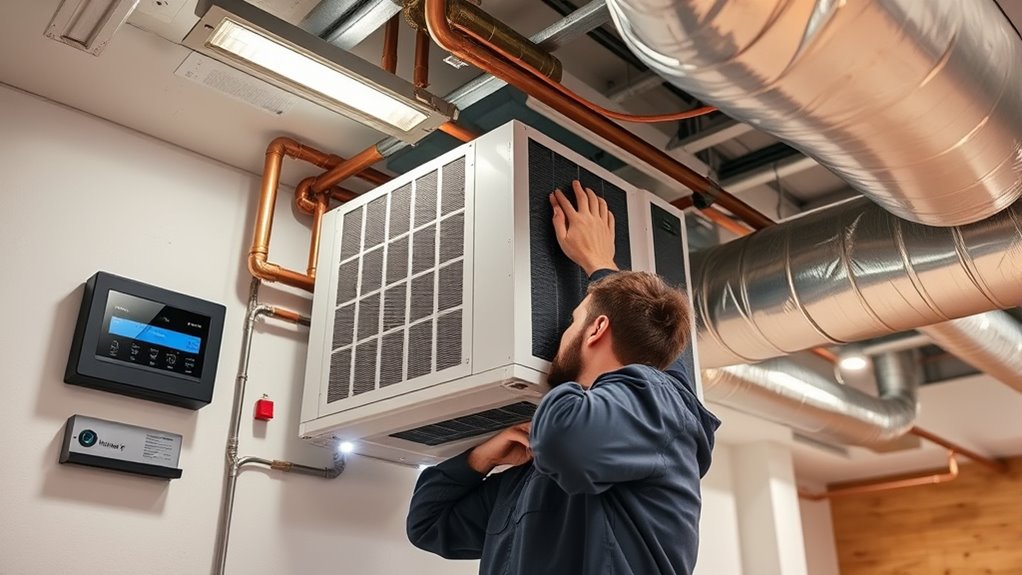
When upgrading your system, considering efficient filtration technologies guarantees cleaner air and better indoor air quality. You should also stay informed about the latest AI discoveries that could influence future HVAC innovations. Additionally, incorporating dual-flush toilets in your bathroom renovation can help conserve water and reduce utility bills. It’s also important to select performance upgrades that match your system’s specifications to ensure optimal operation. Properly assessing system compatibility ensures that new components work seamlessly with your existing setup, preventing potential issues. Making informed choices about these key components can boost performance and extend the lifespan of your HVAC system. Furthermore, understanding the importance of regular maintenance can help preserve system efficiency and prevent costly repairs over time.
Efficient Filtration Technologies
Efficient filtration technologies play a crucial role in enhancing your HVAC system’s performance and indoor air quality. HEPA filters trap 99.97% of airborne particles ≥0.3 microns, providing hospital-grade air purification when integrated into your system.
MERV ratings, ranging from 1-20, help you choose filters that balance filtration efficiency with airflow, with residential filters typically rated between 5-10. Proper filter selection can significantly impact overall system performance and energy consumption.
Air filtration extends beyond filters; activated carbon filters absorb gaseous contaminants and odors, while electrostatic filters generate static electricity to attract particles, requiring regular cleaning. Incorporating personalized work environments can contribute to better motivation and focus when managing your HVAC system upgrades. Additionally, understanding Volkswagen Tuning principles can inspire innovative approaches to optimizing your system’s performance.
UV-C light systems can kill bacteria and mold, further improving air quality. In addition, integrating AI-driven diagnostics can optimize filter replacement schedules and system performance, ensuring your HVAC operates at peak efficiency. Upgrading to these technologies ensures cleaner indoor air, reduces allergens, and boosts your HVAC system’s overall efficiency—making your home healthier and more comfortable.
System Compatibility and Upgrades
Before installing new filtration or air purification systems, it’s important to guarantee they’ll work seamlessly with your existing HVAC system. Compatibility is key when considering upgrades, as your ductwork, wiring, and control interfaces must support new components.
You’ll want to check if:
- Your air filters and filtration systems align with your blower capacity.
- Control interfaces and thermostats are compatible with upgraded controls.
- Electrical requirements, like voltage and circuit capacity, are sufficient for new equipment.
- Additionally, verifying the signs of spoilage in your components can help prevent issues caused by degraded parts. Ensuring system compatibility can also help maintain optimal airflow and prevent performance issues over time.
Conducting a professional system evaluation helps identify potential issues early, ensuring your upgrades integrate smoothly.
Ensuring compatibility not only maximizes performance but also prevents costly modifications down the line, making your system more efficient and reliable. Always verify these factors before proceeding with any upgrade.
Effective Indoor Air Quality Improvements
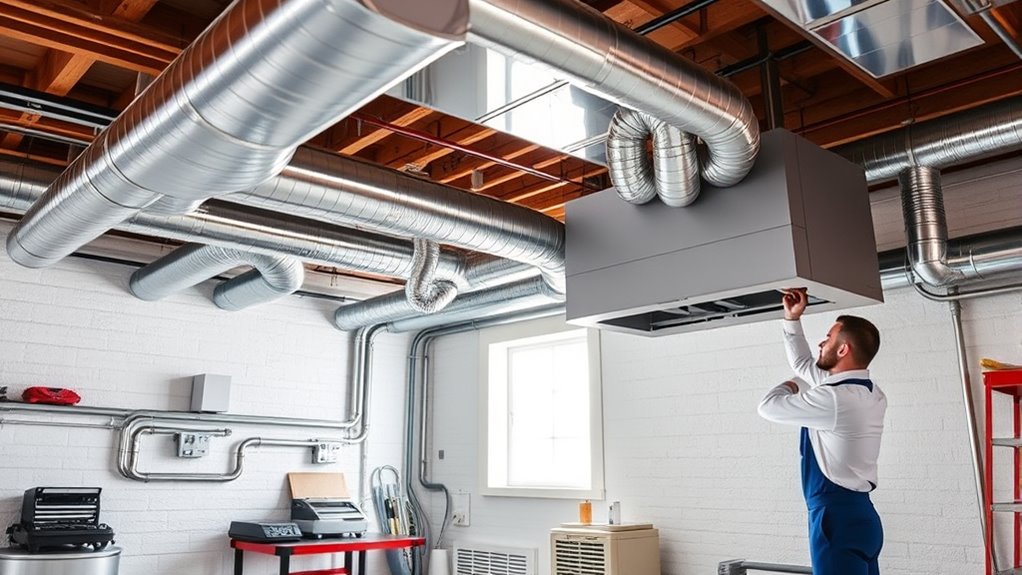
Improving indoor air quality is essential for creating a healthier living environment, and the right upgrades can make a significant difference. Upgrading your HVAC system with high-efficiency air filters, like HEPA filters with a MERV rating of 13-16, can remove up to 99.97% of airborne particles, including mold spores and allergens. Automation technologies in HVAC systems can also enable better control and monitoring of air quality levels. Regular air duct maintenance prevents dust, mold, and other contaminants from circulating through your indoor air. Using air purifiers equipped with UV-C light or ActivePure® technology can neutralize bacteria, viruses, and mold spores, further enhancing air quality. Additionally, maintaining indoor humidity levels between 40-50% helps inhibit mold growth and dust mite proliferation. indoor air quality sensors can provide real-time data to optimize your system’s performance and ensure healthy air quality levels. Incorporating filtration systems is crucial for removing a wide range of airborne pollutants and maintaining a clean indoor environment. Implementing smart home features can also help automate and improve overall indoor air management. Modern HVAC systems with advanced features can significantly enhance energy efficiency and indoor comfort, contributing to a healthier home environment. These improvements help create a cleaner, healthier indoor air environment for you and your family.
Upgrading Ductwork and Zoning Capabilities
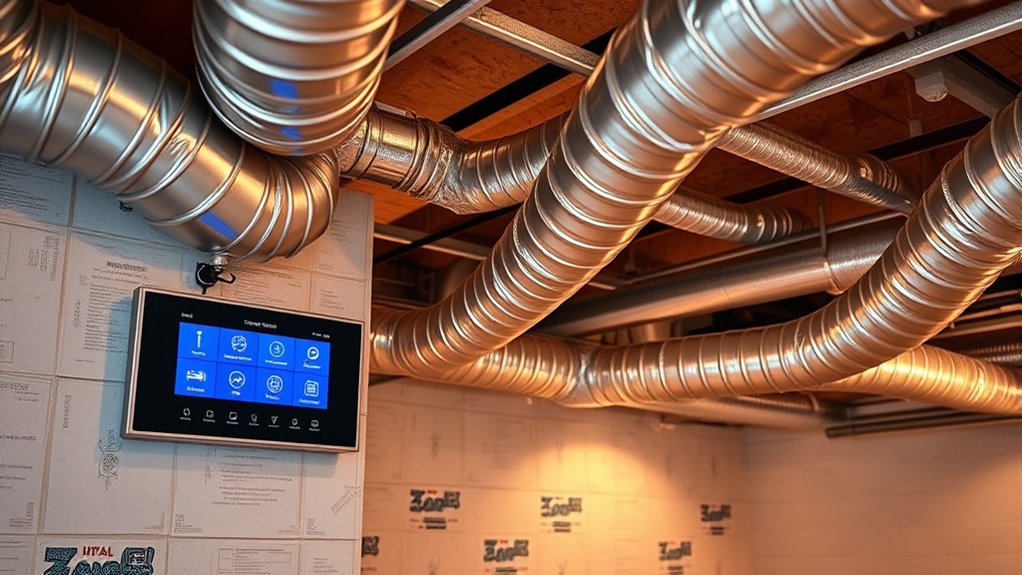
Have you considered upgrading your ductwork and adding zoning capabilities to optimize your HVAC system? Upgrading ductwork involves sealing leaks and ensuring proper insulation, which can boost energy efficiency by over 30%. Properly sized and insulated ducts improve airflow, reducing strain on your system and lowering energy costs. Additionally, integrating zoning dampers allows for more precise temperature control and energy savings. Using smart features such as app control can further enhance convenience and system management. Regular maintenance and professional assessment can identify additional opportunities to improve system performance and longevity.
Incorporating Energy-Efficient Technologies
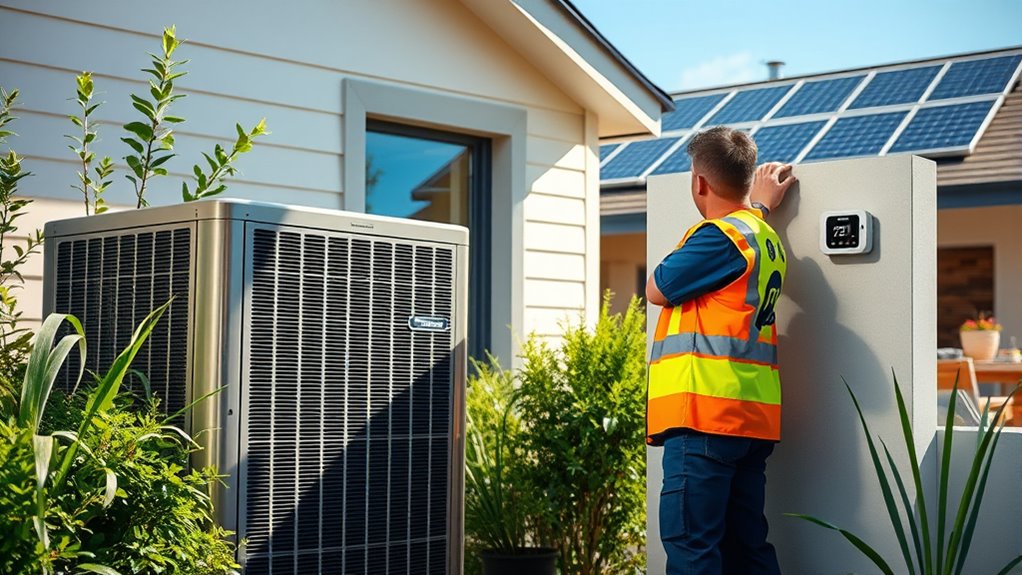
Incorporating energy-efficient technologies can greatly reduce your heating and cooling costs. High-SEER units, smart thermostats, and renewable options like solar and geothermal systems all boost efficiency. Additionally, integrating sound healing science principles, such as using specific frequencies or vibrations, can support a healthier indoor environment and promote relaxation. These advanced systems often incorporate smart controls, which optimize energy use based on occupancy and weather patterns. Implementing these advanced systems not only enhances comfort but also contributes to long-term energy savings, making your home more sustainable and cost-effective. Incorporating energy-saving techniques, like proper insulation and sealing leaks, further enhances the system’s efficiency and reduces overall energy consumption.
High SEER Ratings
Choosing a high SEER rating for your HVAC system guarantees you get a more energy-efficient cooling experience. High SEER units, such as 16 or above, use advanced technologies like variable-speed compressors and smart controls to optimize energy consumption.
Upgrading to a high SEER system can cut your cooling costs by 20-40%, making it a smart financial move. These systems are designed to adapt to your needs, reducing unnecessary energy use.
When selecting your new HVAC system, consider:
- The long-term savings on energy bills
- Eligibility for federal tax credits and rebates
- How modern features improve comfort and efficiency
Investing in a high SEER HVAC system not only lowers your environmental impact but also enhances your home’s comfort through smarter technology.
Smart Thermostat Compatibility
Upgrading to a high SEER HVAC system improves energy efficiency, but pairing it with a smart thermostat takes performance a step further. Smart thermostats are compatible with most modern HVAC systems, including high-efficiency and multi-zone setups, ensuring seamless integration.
They optimize energy use by learning your routines and adjusting temperatures automatically, which can reduce consumption by up to 12%. With remote control via smartphone apps, you can manage your system from anywhere, enhancing convenience and responsiveness.
Features like geofencing and voice control further improve energy efficiency by minimizing waste. Compatibility with these advanced technologies means you gain better control, automation, and savings—making your upgraded HVAC system more intelligent and energy-smart.
Solar and Geothermal Options
Are you looking for ways to maximize your home’s energy efficiency? Solar and geothermal options offer powerful solutions.
Geothermal heating uses underground loops to transfer heat, providing high energy efficiency and reducing operating costs.
Solar thermal systems harness sunlight to generate heat for water and space heating, cutting reliance on traditional energy sources.
To get the most out of these upgrades, consider:
- Installing geothermal heat pumps with efficiencies of 300-600%
- Using solar thermal systems to decrease utility bills
- Combining solar and geothermal tech for maximum renewable energy use
Both options qualify for incentives, rebates, and tax credits, making them more affordable.
These HVAC upgrades not only boost your energy efficiency but also lower your carbon footprint, turning your home into a sustainable, cost-effective space.
Working With Professionals for Optimal Results
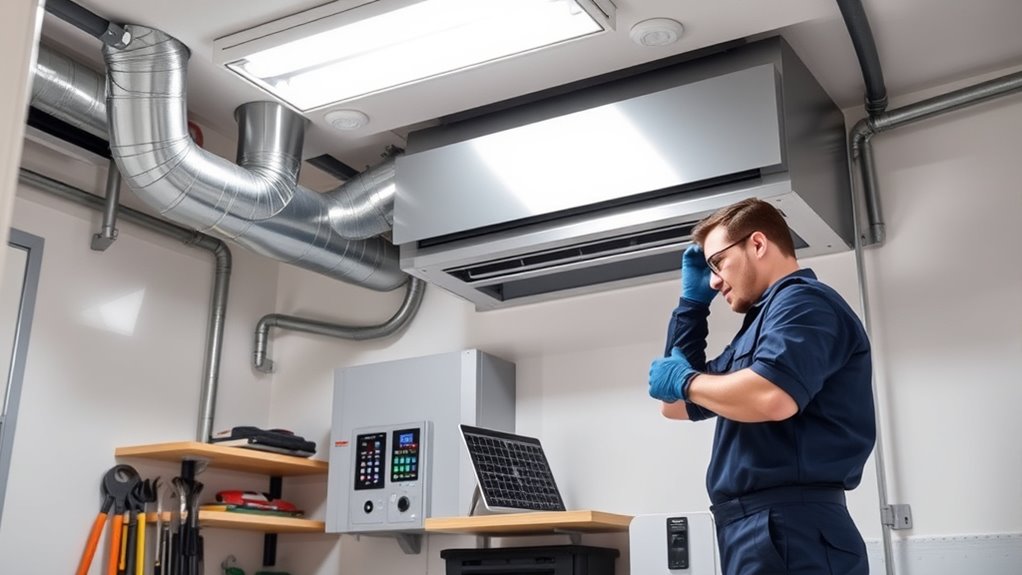
Working with licensed HVAC professionals is essential to guarantee your heating and cooling systems are properly assessed, installed, and maintained. These experts conduct thorough system assessments to ensure compatibility and identify issues like duct leaks or outdated wiring that could impact indoor air quality.
They recommend energy-efficient upgrades tailored to your home, helping you maximize rebates and incentives. Proper installation by trained technicians ensures that advanced components, such as programmable thermostats and zoning systems, operate correctly, optimizing efficiency.
Regular maintenance and system tuning performed by professionals extend your equipment’s lifespan, improve energy savings, and maintain consistent indoor comfort.
Collaborating with licensed HVAC professionals gives you peace of mind, knowing your system is optimized for performance, longevity, and indoor air quality.
Frequently Asked Questions
How Much Does It Cost to Upgrade HVAC System?
You’re probably wondering about the cost to upgrade your HVAC system. It varies based on your home’s size and the system type.
Expect to pay between $4,700 and $12,000 for a central system, or $1,200 to $9,000 for a ductless mini-split.
High-efficiency options like geothermal can go over $18,000.
Keep in mind, adding ductwork or zoning can increase costs by 20-50%.
What Is the $5000 Rule for HVAC?
Think of the $5,000 rule as your home’s thermostat in a busy building. You should consider replacing your HVAC if the total cost, including installation and upgrades, exceeds $5,000.
This helps you weigh the investment against potential energy savings and system lifespan. If repairs near this amount, it’s smarter to replace rather than keep patching up, ensuring comfort and efficiency for years to come.
Is It Worth It to Upgrade HVAC?
You’re wondering if upgrading your HVAC is worth it. The answer is yes, especially if your current system is over 10 years old or costs frequent repairs.
Modern units save you money with 20-40% energy efficiency, improve air quality, and boost comfort.
Plus, incentives like rebates can offset costs.
Over time, these benefits outweigh the initial investment, making it a smart, worthwhile decision.
How Much Does It Cost to Upgrade the Heating System in an Old House?
Upgrading your old house’s heating system can feel like rebuilding a fortress—costs range from $4,000 to $12,000, depending on the system and needed ductwork repairs.
You might spend extra on modifications, but imagine a cozy, energy-efficient home that slashes your bills by 20-40%. The investment can seem steep, but the comfort and savings make it a worthwhile upgrade.
Transforming your house into a warm, efficient haven is achievable with this upgrade.
Conclusion
Upgrading your heating and cooling systems transforms your home into a haven of comfort and efficiency. Don’t let outdated equipment hold you back—think of it as giving your home a gust of fresh air. With the right upgrades, you’ll enjoy lower energy bills, better air quality, and consistent temperatures. So, why wait? Take action now and open the door to the true potential of your home’s comfort—because, after all, a better system is the key to feeling truly at home.
